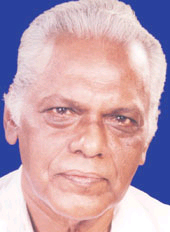
Malayalam music maestro Devarajan passes away
Mar 15, 2006 IANSChennai, March 15 (IANS) G. Devrajan, the man who added melody to Kerala's communist movement in the 1950s and remained a forte of Malayalam films for more than four decades, passed away here.
He was not keeping well for some time and was admitted to a hospital here early this month.
He was discharged from the hospital Tuesday. Following some complications, he was rushed to the hospital again, where he was declared dead late Tuesday night.
He was 79 and is survived by his wife and a son and a daughter.
"Devrajan master can easily be called the inventor of Malayalam film songs. His tunes were often folk based and very much seeped in the ragas made simpler for the layman," said M.G. Sreekumar, reigning Malayalam playback superstar, told IANS. Sreekumar's father Malabar Gopalan Nair, a well-known musician of his time, was a contemporary of Devrajan's father.
"He was a bold person who did not like anyone interfering with his work, a strict disciplinarian and a great human being," said Sreekumar.
Devrajan won the Kerala State Film award for music five times and for drama three times and was also the recipient of Kerala Sangeetha Nataka Fellowship.
The sound of Malayalam film music has changed beyond recognition since Devrajan's prime, and theatre - his first playground - has ceased to be major creative force in the state.
Yet, even today, the tunes of "Balikudeerangale" - that feisty tribute to martyred revolutionaries - or that moving call of the lovelorn maiden - "Chakkarapandalil" remain popular with the masses.
Paravoor Govindan Devarjan or simply Devarajan's romance with music composition began with the theatre company Kerala People's Arts Club (KPAC), known for its distinctive communist leaning, to which the aforesaid classics belong.
Born in September 1927 into a family where music was revered and nurtured, Devarajan's father and first guru Paravur N. Kochu Govindan Aasan was a formally trained singer and accomplished Mridangam player.
He was initiated as a vocalist in 1948, and he started singing at stage concerts and temple programmes. He gradually moved to composing songs for stage plays and made his debut in the film "Kaalam Marunnu" (1955).
Although the first song he composed was written by childhood friend M.K.R. Pillai, it is his association with two other men that became the fountainhead of melody and magic.
He sprinkled magic into words penned by O.N.V. Kurup for KPAC and brought forth gems like "Chillimulam Kadukalil" (drama: "Mudiyanaya Puthran") and "Valli kudilin" (drama: "Ningal Enne Communist Aakki").
When he burst into Kerala's film music scene with his first hit "Bharya" (1962), he set hearts on fire with "Periyare, Periyare" - a song that eulogised the rustic Malayalee woman, comparing her to central Kerala's scenic Periyar river.
The song also brought Devarajan's second partnership - that with the great poet and communist ideologue Vayalar Rama Varma.
Vayalar was highly temperamental but genius of a lyricist. The team went on to create hit after hits till Vayalar's death in 1975.
Devarjan master, as he was called by colleagues and friends - was perhaps the most prolific of all composers of the old camp. Yet, he never compromised on melody and depth for crass populism.
During the last 50 years, Devarajan scored the music for 353 films and innumerable plays.
According to a rough estimate, during the two decades between 1960 and 1980, leading playback singer K.J. Jesudas alone must have rendered almost 500 film songs set to tune by Devarajan.
He ventured into Tamil films with the dubbed "Kumara Sambhavam" (1969) and followed it up with "Kaaval Deivam", and topped with his haunting score for "Thulabaram", all in the same year.
He signed off on the late 1980s disgusted with "degenerative trends" in the trade. However, he declared his intention to take on those elements, who he alleged were guilty of orchestrating the atrophy.
One of the most plagiarised original composers of his time, he charged famed music director duo Bernie Ignatius of directly "lifting off" the tune of Pankaj Mullick's "Piya Milna Ko Jana" ("Kapak Kundla", 1938) for their "Ente Manassil Oru Nanam" ("Thenmaavin Kombatthu", 1995).
In what was the first such instance in the Indian music industry, Devarajan claimed rights for his original scores of the 60s and 70s by filing a civil suit at the Ernakulam Munsiff Court against five cassette companies.
He may have breathed his last, but Devarajan master's tunes will keep generations of Malayalees tied to their musical roots.
More News










